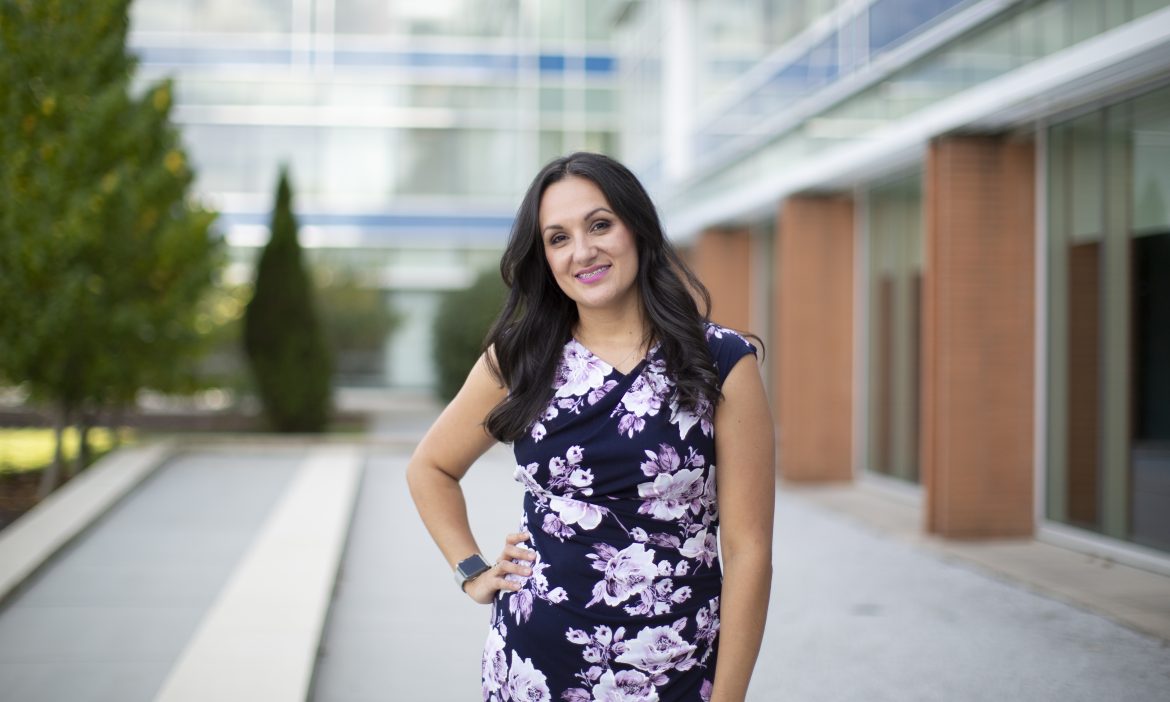The term “Hispanic” covers a wide swath of cultures across the world map. At BlueCross, we celebrate this melting pot of experiences and people, how they make up a growing part of our state’s population, and how they help us better serve our members.
The U.S. Census Bureau uses terms “Hispanic” and “Latino” interchangeably, but there can be differences — and some people have different preferences. Hispanic can refer to a person of Spanish descent, someone from Spain, someone who has Spanish ancestors, while Latino and Latina often refer to those whose cultural identity is from Latin American countries.
Diverse voices strengthen our employee experience and pursuit of our mission. That’s why we coordinate annual awareness events that help us understand one another better so we can improve the lives of all Tennesseans.
In honor of Hispanic Heritage Month, some of our employees share their voices, their backgrounds, and why family holds special meaning for all of them.
Diana Barroso, correspondence specialist, BlueCare
When Diana was a high school freshman in her native Colombia, her father lost his job. A few months later, her entire immediate family was living in Cleveland, Tenn.

“My aunt was living in Cleveland, and she talked to my dad about how it was a nice little town and a great place to raise children,” Diana recalls. “And so Mom and Dad decided to move to the U.S. with my sister, my brother and I in 1999.”
The transition was difficult, as it was Diana’s first time in the U.S., and she knew very little English. Her uncle had her read newspaper articles and highlight words she couldn’t pronounce or had never heard. (“Which was pretty much everything,” Diana says.) Her family watched English-language movies on VHS tapes together every single night, and she took ESL (English as a second language) classes at her new school.
She even found assistance from an unlikely source — the Backstreet Boys.
“I had a mad obsession with them back in the day,” she laughs. “I would put on my headphones and try to match the lyrics in the CD booklet to what I was hearing.”
By the end of her junior year, Diana was comfortable speaking English. She credits her supportive parents, her committed teachers, school activities like swimming, and her refusal to be bullied as motivation she needed.
“Just like a puzzle, all the pieces fell together where they needed to be,” she says. “And we were not depending on other people anymore to communicate with us.”
In fact, Diana saw how much others depended on her for communication. In 2015, she entered the health care field, first as an interpreter at the Bradley County Health Department, then as a peer counselor for the State of Tennessee’s WIC program. Through that role, she began helping low-income pregnant women apply for insurance provided by the state that only covers the duration of the pregnancy.
“I was blessed to help a lot of Hispanic women,” she says. “That job was a turning point because I felt I could make a difference by speaking two languages.”
Today Diana uses that gift at BlueCross, frequently conversing with our Spanish-speaking members. Almost every time she does so, she hears the instant relief in these members’ voices, a relief that comes with knowing they are being heard, understood, and will have their needs met.
That drive to help others was fostered in Colombia, where Diana says family and closeness are defining parts of the culture.
“We’re very warm people,” she says. “We embrace people, we’ve never met a stranger. We’ve always been taught to be united. Even during these last 18 months, we’re constantly checking on everybody, trying to be as close as we can in the midst of all the changes in the world.”
Diana’s Colombian values remain firmly rooted — but after living here for more than two decades, she’s a proud Tennessean.
“I’ve now spent more of my life here than Colombia, so the U.S. is my country, as well,” she says.
“Sometimes people in other cultures think of the American dream as coming here and making loads of money, but that’s not it. It’s coming here with hopes that things will be better, embracing the culture, and then making a living while making a positive difference in the lives of others.”
Juan Cacicedo, team lead, business engineering
Spend even a few minutes with Juan, and his enthusiasm is infectious, whether he’s discussing, his love of working with a team in process improvement at BlueCross, the joys of Tennessee, or his roots.

“I was born in San Pedro Sula, Honduras, to a mother born in Honduras and a father from Cuba who became a naturalized Honduran citizen,” he says. “They’re both of Spanish descent, and according to my mother, we’re proud to have a little mixture of Native Honduran-Mayan heritage.”
“That’s probably where I get my creativity and temper,” he adds with a laugh.
One way his creativity manifested was a passion for engineering. That passion brought him to the States in 1989 to attend Georgia Southern University, then a small college in Statesboro.
“I fell in love with the south — the culture and all of the people,” Juan says. “I found my way to Chattanooga because I met a beautiful young lady who captured my heart, and she and her family lived in the area. We decided to start a family and call Chattanooga home.”
Echoing a sentiment shared by Diana — and emblematic of Hispanic culture broadly — Juan cherishes every minute he’s able to spend with family.
“When I was 9, we tragically lost my father,” he says. “But God was kind enough to give me a second father, and that resulted in me having two wonderful brothers who I love very much. Yes, we’re three brothers who got involved in lots of mischief, and I now sympathize with our parents.”

Recalling his parents, Juan admits he misses celebrating holidays in Honduras.
“The way families and friends gather is very similar to the U.S., but in Honduras Good Friday is a major holiday,” Juan says. “It’s celebrated to the same extent we see Christmas celebrated here.”
There’s one other thing Juan misses, as well.
“Banana soda is very popular in Honduras, and I recently had one after many years,” he says. “I never realized how sweet it was! I’m not even sure where ‘banana’ falls on the list of ingredients, but it’s still good!”
To celebrate Hispanic Heritage Month, Juan and his family plan to stay home and watch cultural appreciation videos from all over the world.
“We’ll also order Mexican, Guatemalan, Cuban or Peruvian takeout,” he says. “There are restaurants for each in Chattanooga, another reason I love it here.”
Maria Darras, vice president, commercial operations
Though born in Knoxville, Maria has strong connections to her father’s native Peru.
“My parents met at the University of Tennessee – Knoxville and moved to Chattanooga when I was a child, but I spent most of my summers until I was 18 with my family in Peru,” she says. “My father only spoke to my sister and I in Spanish, and he made a point to keep us engaged with our Hispanic culture and Peruvian roots.”

Maria has continued visiting Peru throughout her life. When asked about an aspect of Peruvian culture she appreciates, she doesn’t hesitate: “Family.”
“Ask any Hispanic and they’ll tell you the importance of family. My Peruvian family truly lives and breathes that,” Maria elaborates. “I’m not saying other cultures don’t, but I’ve seen firsthand how we put family first. We intentionally slow down our lives to enjoy each other’s company, and we’ll do anything and everything to take care of each other.”
“It’s not uncommon to see multiple generations living together — not because they can’t move out and live on their own, but because family is a critical part of their life.”
Maria acknowledges it’s been difficult not seeing her extended family since the pandemic. During the past 18 months, the U.S and Peru have placed limitations on travel. Even when those were lifted, there was still a concern with outbreaks and quarantine guidelines making visits less rewarding.
“I miss spending time with them in person, but the daily communication remains constant,” Maria says. “Phone calls, FaceTime, and a family version of WhatsApp allow pictures to be shared and everyone to be included. Those have helped significantly, but I’m hoping for a visit early next year.”

As for this year, Maria plans to celebrate Hispanic Heritage Month close to home as the Delta variant continues to surge. But even with a smaller gathering and safety precautions in place, it will still very much be a celebration.
“We’re planning a cookout with all the staple foods — ceviche, anticuchos de pollo, maybe lomo saltado — some Inca Cola, and a Tres Leche cake,” she says. “And there will of course be lots of laughs, music and dancing. We’ll create a family playlist, or someone will pick up a guitar and everyone will sing along.” (“Canta y No Llores” is a family favorite.)
“But honestly, I celebrate every time I’m with family — whether in Peru or in the U.S.,” Maria adds with a laugh. “We can always come up with a reason to get together and have a cookout.”


 Jesse joined the BlueCross BlueShield of Tennessee corporate communications team in 2017. A Chattanooga native, he has more than 15 years’ experience in content creation, management, and strategy for consumer audiences, including a six-year stint in health care marketing.
Jesse joined the BlueCross BlueShield of Tennessee corporate communications team in 2017. A Chattanooga native, he has more than 15 years’ experience in content creation, management, and strategy for consumer audiences, including a six-year stint in health care marketing.